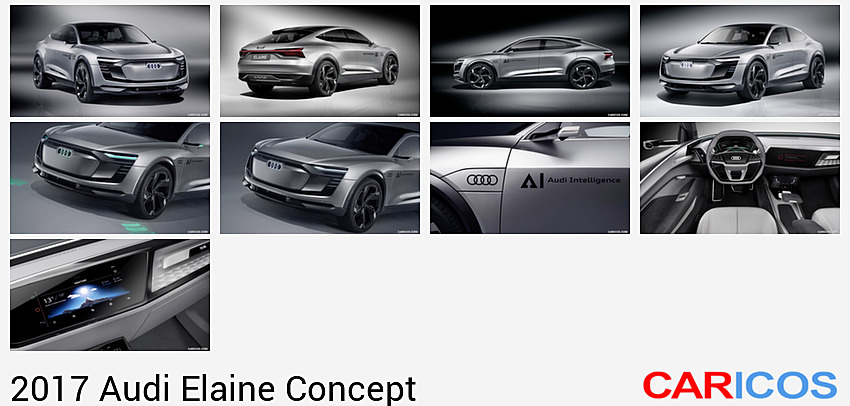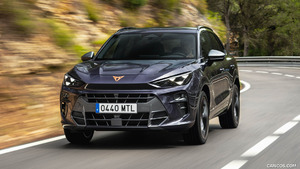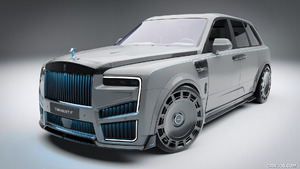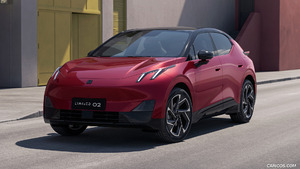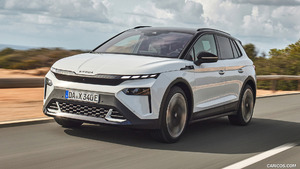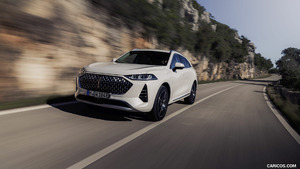Audi Elaine Concept
A familiar face – The exterior of the Audi Elaine concept car debuted just a few months ago. In May 2017, Audi presented the celebrated Audi e-tron Sportback design study and technology demonstrator at Auto Shanghai in China. The IAA debutant shares its body line, electric drive and not least its distinctive exterior lighting with the precursor to the second production electric car from Audi.
23-inch wheels in a technical 6-spoke design highlight the confident presence of the SUV coupe. An exterior length of 4.90 meters (16.1 ft), a width of 1.98 meters (6.5 ft) and a height of 1.53 meters (5.0 ft) with a wheelbase of 2.93 meters (9.6 ft) position the Audi Elaine in the C segment, close to the Audi A7. The interior is bright and designed for simplicity. Functions are clearly structured, the number of control elements vastly reduced. Expansive touchscreens below the central display, on the center console and in the door trims supply information and interact with the on-board systems. Horizontal surfaces on the dashboard and the seemingly floating center console convey a sense of open perspectives for the four passengers in their individual seats.
The concept car’s lighting technology is an innovation that is visible by both day and night. Digitally controlled Matrix LED units at the front and rear produce an excellent light yield. Minuscule Digital Matrix projectors literally make their mark on the road ahead, turning light into a versatile, dynamic channel of communication with the surroundings. Other road users can also be informed of the various driving modes, such as when the vehicle is driving autonomously. The Audi Elaine uses animated LED fields to greet passengers individually when they enter or exit the vehicle.
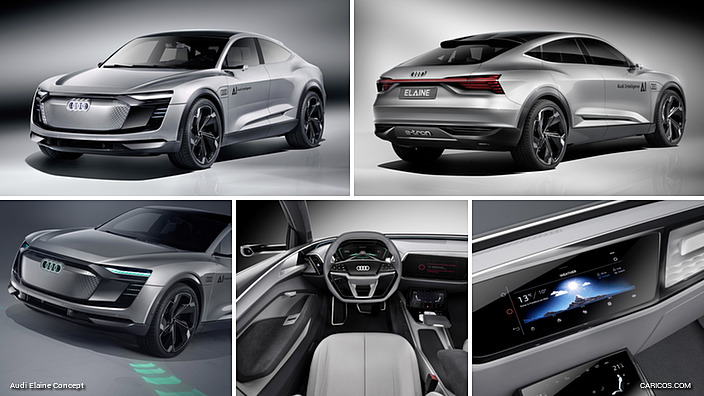 2017 Audi Elaine Concept
2017 Audi Elaine Concept
For its drive, the Audi Elaine uses a configuration that Audi will use in future production models with all-electric drive: One electric motor on the front axle and two on the rear power all four wheels, transforming the high-performance coupé into a quattro in typical Audi style.
320 kilowatts of power – which can even reach 370 kW in the boost mode – provide a fitting level of propulsion. Elaine sprints from 0 to 100 km/h (62.1 mph) in just 4.5 seconds. With the battery’s energy content of 95 kilowatt-hours, its range is in excess of 500 kilometers (310.7 miles) (NEDC). There are two options for charging the battery: a wired fast charging function at 150 kW or wireless charging via the Audi Wireless Charging system.
Highly automated with Audi AI
Setting the Audi Elaine apart from the Shanghai show car are numerous functions that push the envelope for piloted driving and assistance systems, and in a few years will also extend the scope of Audi AI in production models. The foundation is provided by a much more advanced zFAS controller installed in the rear.
The new generation processor has more computing power and refined sensors with even greater range and precision. The Audi Elaine can therefore serve its owner as a highway pilot, relieving the burden on the driver over extended distances. The highway pilot is an extension of the traffic jam pilot in the A8 and allows piloted driving at speeds from 60 to 130 km/h (37.3 to 80.8 mph), which in most countries is the maximum permissible speed.
When the highway pilot is active, the Audi Elaine changes lanes automatically – it can pass and then return to the original lane, for example. It can initiate, perform and complete such actions autonomously, without any involvement of the person behind the wheel. If the driver does want to intervene, they can do so spontaneously at any time.
The Audi Elaine continues to support the driver after leaving the highway and multilane urban freeways behind. All of the usual driver assistance systems are on board, including the pre sense safety technologies and the predictive efficiency assistant, which can be provided with even more precise route details from the HERE navigation data.
Time savings and comfort gains
Audi is continually expanding the infotainment functions, with ever-faster internet connections making it possible to share large quantities of data during the journey. Simultaneously, the integration of communications media in the vehicle continues to advance. They allow people to work inside the vehicle, for example, taking part in a video conference. Drivers have more time and more choice as to how they use the time aboard the vehicle. The car of the future has great potential for time savings and comfort gains. In specially designated areas called Audi AI Zones, an Audi will be able to perform a variety of tasks autonomously while the driver works or engages in leisure activities.
Audi AI Zone
The networking of the car and the infrastructure is crucial for driverless mobility. The driver parks the Audi in a designated area (the handover zone) and exits the vehicle. From there, the car drives automatically and unoccupied into a multistory parking garage offering a variety of services, such as a car wash, a package station, a gas station or a charging post. Thanks to Audi AI, the car does all of this itself. Connected with its surroundings, the intelligent Audi can even locate an unmarked parking space on the side of the road and pull precisely into it.
At the desired time, the vehicle is back in the handover zone, ready for its next journey. Drivers can follow the actions of their vehicle at all times and even add new tasks using an app.
Customers of the premium brand will soon be able to save time and enjoy greater convenience in Audi AI Zones. Audi is currently developing a standard interface for a wide variety of smart devices and is preparing web-based, vehicle-specific apps. The project is almost ready for production. The Audi Elaine will thus become an IoT device (internet of things), seamlessly and smartly integrating itself within the world of its user.
Assistant and butler – PIA
The best operating concept is the one that is ideally adapted to the driver, the one that relieves him/her of as many actions as possible and that autonomously carries out routine operational inputs. PIA, the personal intelligent assistant, follows precisely this principle. Using artificial intelligence methods, PIA combines data intelligently with one another – data from the car, data about the driver, traffic jam reports and traffic projections, as well as information from the internet. PIA also responds to voice inputs and uses tailored algorithms to communicate autonomously and adaptively with the user.
PIA gets to know the driver by observing their behavior patterns. This opens it up to use for a broad range of applications: navigation, selection of music, selection of the desired Audi connect service, climate control, suggestion of a parking space or maintaining the regular distance to vehicles ahead on the highway. PIA applies machine learning methods to gain insights and adapts the car’s functions to the behaviors and needs of the driver. It also makes active recommendations.
A server in the secure Audi cloud hosts and processes the PIA data. Customers can view and manage this data at any time via their myAudi account. They can delete or edit this data, for instance in the case of a move. What’s more, they can be automatically transferred to other cars. The car identifies the individual user, loads their user profile, and PIA then adapts the car and its interactive behavior accordingly.
Car-to-X technology
See more than with the human eye or the infra-red camera – Car-to-X technology expands the horizon of the established vehicle sensors based on radars, cameras and ultrasound, by supplementing these with information obtained from far away and outside of the field of vision of the driver. Car-to-X, the real-time communication between cars and with the infrastructure, offers greater safety, comfort and efficiency. In this way, the car recognizes dangerous situations even earlier and accidents can be avoided.
Audi Fit Driver
Every Audi today already is equipped with the latest technology and offers top-level comfort and safety. As a private place of retreat and all-round networked space, a car is an ideal place for monitoring fitness levels and can also actively improve the health and well-being of the driver. Projects like Audi Fit Driver make the Audi Elaine concept vehicle an empathetic companion. In many situations, it knows what the driver needs. A wearable device on the driver’s wrist provides the data. It collects and transmits information about the most important vital signs, such as body temperature and heart rate.
If Audi Fit Driver detects increased stress or fatigue, for example, the vehicle systems adapt themselves accordingly in a relaxing, a vitalizing or a protective manner. Thanks to intelligent algorithms, the system gets to know the driver better and better.
With Audi Fit Driver, driver can for the first time actively reduce stress and improve their concentration. If the system notices that the driver is highly stressed, this can be reduced by means of a special breathing technique. The Audi virtual cockpit displays bio-feedback like that used in performance sports as a guide. Additionally, a voice over the loudspeakers guides the driver through the exercise. Whether it be relaxing breathing exercises, energizing seat massage functions to the beat of the music, special climate control functions, adaptive infotainment measures or perfectly-suited interior lighting moods: The objective of Audi Fit Driver is a driving experience optimally tuned to the driver’s condition. Drivers should be more relaxed when they get out of the car than when they got in.

